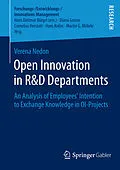Based on interviews with R&D managers and a survey amongst R&D employees, Verena Nedon shows that perceived social pressure has an immense impact on R&D employees working in OI-projects. Employees' attitude (regardless of whether positive or negative) and perceived behavioral control play an important, but not dominant role. The study also implies that intrinsic motivators have a stronger effect on employees' willingness to engage in knowledge exchange with external partners than extrinsic components. By targeting a set of relevant questions related to the human side of open innovation, the study significantly contributes to the micro-foundation of OI-research and sheds light on the hitherto neglected perspective of employees engaged in OI-projects. The findings are relevant for scholars, companies already following the OI-approach, and OI-newcomers.
Contents
- Knowledge Exchange in OI-Projects
- Individual Behavior
- Theory of Planned Behavior
- Managerial Implications
Target Groups
- Researchers and students of Innovation Management (Open Innovation), R&D, and Business Psychology
- People who are interested in Innovation Management (Open Innovation), R&D, and Project Management
The Author
Verena Nedon does research on open innovation at the Institute of Technology and Innovation Management (TUHH), focusing on knowledge exchange between R&D employees and external partners in OI-projects.
Autorentext
Verena Nedon does research on open innovation at the Institute of Technology and Innovation Management (TUHH), focusing on knowledge exchange between R&D employees and external partners in OI-projects.
Klappentext
Based on interviews with R&D managers and a survey amongst R&D employees, Verena Nedon shows that perceived social pressure has an immense impact on R&D employees working in OI-projects. Employees' attitude (regardless of whether positive or negative) and perceived behavioral control play an important, but not dominant role. The study also implies that intrinsic motivators have a stronger effect on employees' willingness to engage in knowledge exchange with external partners than extrinsic components. By targeting a set of relevant questions related to the human side of open innovation, the study significantly contributes to the micro-foundation of OI-research and sheds light on the hitherto neglected perspective of employees engaged in OI-projects. The findings are relevant for scholars, companies already following the OI-approach, and OI-newcomers.
Contents
- Knowledge Exchange in OI-Projects
- Individual Behavior
- Theory of Planned Behavior
- Managerial Implications
Target Groups
- Researchers and students of Innovation Management (Open Innovation), R&D, and Business Psychology
- People who are interested in Innovation Management (Open Innovation), R&D, and Project Management
The Author
Verena Nedon does research on open innovation at the Institute of Technology and Innovation Management (TUHH), focusing on knowledge exchange between R&D employees and external partners in OI-projects.
Inhalt
Knowledge Exchange in OI-Projects.- Individual Behavior.- Theory of Planned Behavior.- Managerial Implications.
